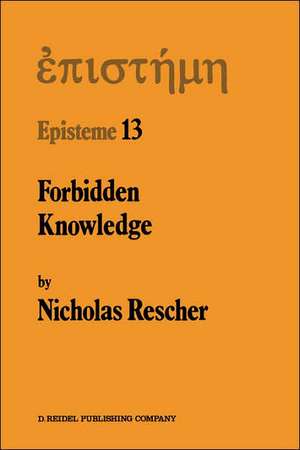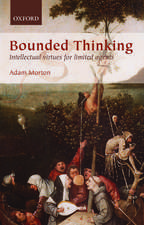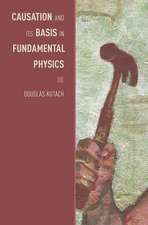Forbidden Knowledge: And Other Essays on the Philosophy of Cognition: Episteme, cartea 13
Autor N. Rescheren Limba Engleză Hardback – 31 aug 1987
| Toate formatele și edițiile | Preț | Express |
|---|---|---|
| Paperback (1) | 633.84 lei 6-8 săpt. | |
| SPRINGER NETHERLANDS – 17 oct 2011 | 633.84 lei 6-8 săpt. | |
| Hardback (1) | 640.71 lei 6-8 săpt. | |
| SPRINGER NETHERLANDS – 31 aug 1987 | 640.71 lei 6-8 săpt. |
Din seria Episteme
- 20%
 Preț: 306.88 lei
Preț: 306.88 lei - 18%
 Preț: 951.91 lei
Preț: 951.91 lei - 15%
 Preț: 647.08 lei
Preț: 647.08 lei -
 Preț: 395.63 lei
Preț: 395.63 lei - 20%
 Preț: 993.42 lei
Preț: 993.42 lei - 18%
 Preț: 939.28 lei
Preț: 939.28 lei -
 Preț: 398.92 lei
Preț: 398.92 lei - 15%
 Preț: 644.30 lei
Preț: 644.30 lei - 15%
 Preț: 644.63 lei
Preț: 644.63 lei - 18%
 Preț: 953.20 lei
Preț: 953.20 lei - 20%
 Preț: 553.11 lei
Preț: 553.11 lei - 18%
 Preț: 894.46 lei
Preț: 894.46 lei - 15%
 Preț: 651.67 lei
Preț: 651.67 lei - 18%
 Preț: 954.62 lei
Preț: 954.62 lei - 15%
 Preț: 643.99 lei
Preț: 643.99 lei - 20%
 Preț: 328.79 lei
Preț: 328.79 lei -
 Preț: 380.25 lei
Preț: 380.25 lei -
 Preț: 388.90 lei
Preț: 388.90 lei - 15%
 Preț: 654.12 lei
Preț: 654.12 lei - 18%
 Preț: 1231.64 lei
Preț: 1231.64 lei -
 Preț: 387.38 lei
Preț: 387.38 lei -
 Preț: 380.45 lei
Preț: 380.45 lei -
 Preț: 388.90 lei
Preț: 388.90 lei - 18%
 Preț: 948.79 lei
Preț: 948.79 lei
Preț: 640.71 lei
Preț vechi: 753.77 lei
-15% Nou
Puncte Express: 961
Preț estimativ în valută:
122.60€ • 127.75$ • 101.51£
122.60€ • 127.75$ • 101.51£
Carte tipărită la comandă
Livrare economică 03-17 aprilie
Preluare comenzi: 021 569.72.76
Specificații
ISBN-13: 9789027724106
ISBN-10: 9027724105
Pagini: 172
Ilustrații: XIV, 154 p.
Dimensiuni: 155 x 235 x 15 mm
Greutate: 0.43 kg
Ediția:1987
Editura: SPRINGER NETHERLANDS
Colecția Springer
Seria Episteme
Locul publicării:Dordrecht, Netherlands
ISBN-10: 9027724105
Pagini: 172
Ilustrații: XIV, 154 p.
Dimensiuni: 155 x 235 x 15 mm
Greutate: 0.43 kg
Ediția:1987
Editura: SPRINGER NETHERLANDS
Colecția Springer
Seria Episteme
Locul publicării:Dordrecht, Netherlands
Public țintă
ResearchCuprins
One/Forbidden Knowledge: Moral Limits of Scientific Research.- 1. A Range of Positions.- 2. Regulation vs. Laissez Faire.- 3. Moral Limits Pertain to Different Aspects of Knowledge.- 4. Can Knowledge as Such be Morally Inappropriate?.- 5. Knowledge is Only One Good among Others.- 6. The Enforcement of Morals.- 7. Coda.- Two/Truth as Ideal Coherence.- 1. The ‘Continuity Condition’ Relating a Criterion to the Definition of Truth.- 2. Truth as Ideal Coherence.- 3. Coherentism and Truth as Adequation.- 4. Postscript: The Gap Between the Real and the Ideal.- Three/Rationality and Consistency.- 1. Consistency: Initial Requisite or Ultimate Ideal?.- 2. Linearly Inferential vs. Dialectically Cyclic Reasoning.- 3. Ampliative vs. Reductive Reasoning.- 4. Two Very Different Sorts of Acceptability: Qualified vs. Outright Belief.- 5. Different Attitudes Towards Consistency.- 6. The Place of Dialectics in the Human Sciences.- 7. Must Inconsistency-Tolerance Be Motivated Epistemically?.- 8. Consistency as a Cognitive Ideal.- Four/An End to Science?.- 1. Is Scientific Discovery an Inherently Bounded Venture?.- 2. Nature Might Exhibit an Unending Complexity of Physical Constitution.- 3. Nature Might Exhibit an Unending Complexity of Lawful Comportment.- 4. The Phenomena of Nature Might Be Unendingly Diverse.- 5. The Basis for an Unending Prospect of Scientific Discovery Might Lie Wholly in the Character of Our Inquiry Processes.- 6. The Regulative Rationale for Supposing the Cognitive Inexhaustibility of Nature.- Five/On the Probabilistic Bearing of Testimony.- 1. Introduction.- 2. The Reliability of Sources.- 3.The Knowledgeability of Sources.- 4. Some Variations.- 5. A Survey of Probative Virtues.- 6. The Taxicab Problem.- 7. Hume and Laplace on Human Testimony.- 8. Laplace onTestimonial Chains.- 9. The Moral of the Story.- Six/The Limits of Probabilistic Epistemology.- 1. The Probabilist Program.- 2. Probability Is Not Enough.- Seven/The Threefold Way.- 1. The Three Levels.- 2. Some Examples.- 3. Man as a Creature of the Threefold Way.- 4. The Question of Legitimacy: The Utility of the Ideal.- Eight/Number Idolatry and Fallacies of Quantification.- Nine/Life’s Seasons: The Conceptual Phenomenology of Age-Periodization.- 1. The General Idea of a Life Cycle.- 2. The Rationale of Human Age-Periodization Phase Transitions.- 3. The Diversity of Age.- 4. The Conventionality of Phase Transition.- 5. Thought Experiments.- 6. The Upshot.- 7. Broader Vistas.- Ten/Philosophical Taxonomy as A Philosophical Issue.- 1. The Shape of Philosophy: Some Ancient Views.- 2. The Middle Ages and Early Modern Times.- 3. A Later Picture.- 4. Taxonomic Dynamics.- 5. The Post-Kantian Transformation.- 6. Taxonomic Proliferation.- 7. The Contemporary Situation.- 8. The Problem of Progress.- 9. The Dialectic of the Individual and the Community.- 10. Conclusion.- Eleven/Is Philosophy a Guide to Life?.- 1. Philosophy: The Problematic Guide.- 2. The Problem of ‘Applied Philosophy’: Only One’s Own Philosophy Can Provide Guidance.- 3. What Philosophy Per Se Can Contribute.- 4. Some Examples of ‘Applied Philosophy’ in the Public Domain.- 5. The Limited Utility of Methodological Applications.- 6. A Danger of ‘Applied Philosophy’.- Notes.- Index of Names.

















